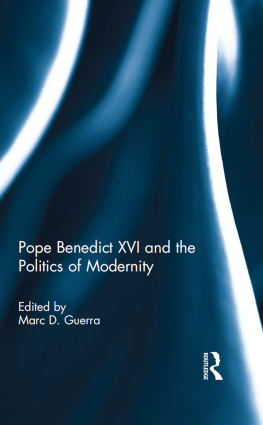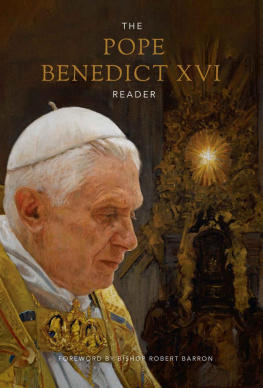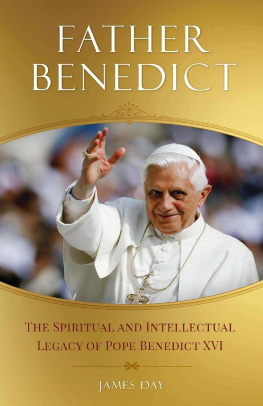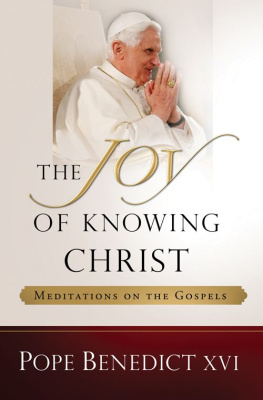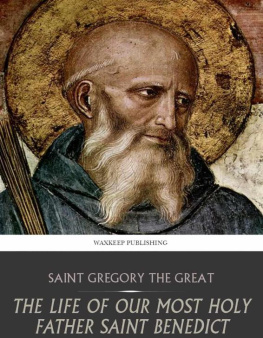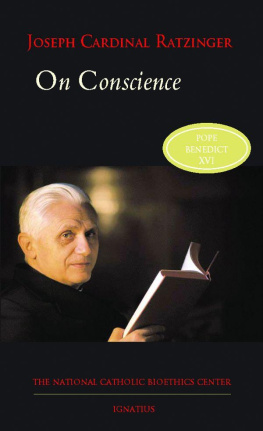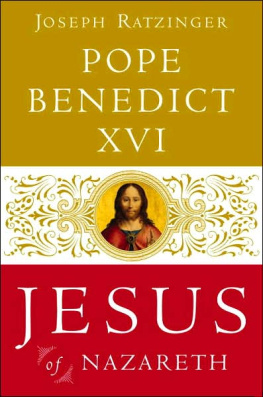Pope Benedict XVI and the Politics of Modernity
In Pope Benedict XVI and the Politics of Modernity, distinguished scholars from North America and Europe examine Pope Benedict XVIs searching reflections on the challenges and prospects facing modern Western society. For more than five decades, Joseph Ratzinger/Pope Benedict XVI has made the subject of the continued health and vitality of Western civilization a focal point of his reflections. From his early (1968) Introduction to Christianity to his later (2005) Values in a Time of Upheaval, the Pope has argued that the preservation of the social, political, scientific, and spiritual way of life that characterizes modern Western societies hinges upon our rediscovery of the unique roots and distinctive nature of Western civilization.
Focusing on Pope Benedict XVIs nuanced account as to why the modern West cannot currently afford to forget or neglect its premodern Hellenic and Christian roots, this book will interest religious and non-religious people who are concerned about the future of democracy and religion in contemporary Western societies.
This book was based on a special issue of Perpsectives on Political Science.
Marc D. Guerra is Associate Professor and Chair of Theology at Assumption College in Worcester, Massachusetts. He is the author of Christians as Political Animals and editor of Reason, Revelation, and Human Affairs, Jerusalem, Athens, and Rome, and The Science of Modern Virtue: Essays on Descartes, Darwin, and Locke.
Pope Benedict XVI and the Politics of Modernity
Edited by
Marc D. Guerra
First published 2014
by Routledge
2 Park Square, Milton Park, Abingdon, Oxon, OX14 4RN
and by Routledge
711 Third Avenue, New York, NY 10017
Routledge is an imprint of the Taylor & Francis Group, an informa business
2014 Taylor & Francis
All rights reserved. No part of this book may be reprinted or reproduced or utilised in any form or by any electronic, mechanical, or other means, now known or hereafter invented, including photocopying and recording, or in any information storage or retrieval system, without permission in writing from the publishers.
Trademark notice: Product or corporate names may be trademarks or registered trademarks, and are used only for identification and explanation without intent to infringe.
British Library Cataloguing in Publication Data
A catalogue record for this book is available from the British Library
ISBN13: 978-0-415-63714-5
Typeset in Garamond
by Cenveo Publisher Services
Publishers Note
The publisher accepts responsibility for any inconsistencies that may have arisen during the conversion of this book from journal articles to book chapters, namely the possible inclusion of journal terminology.
Disclaimer
Every effort has been made to contact copyright holders for their permission to reprint material in this book. The publishers would be grateful to hear from any copyright holder who is not here acknowledged and will undertake to rectify any errors or omissions in future editions of this book.
Contents
Marc D. Guerra
James V. Schall, S.J.
Patrick N. Cain
Philippe Bnton
Rachel A. Amiri and Mary M. Keys
Angela C. Miceli
J. Brian Benestad
Peter Augustine Lawler
The following chapters were originally published in Perspectives on Political Science, volume 41, issue 1 (2012). When citing this material, please use the original page numbering for each article, as follows:
On the Curious Discipline of Political Philosophy
James V. Schall, S.J.
Perspectives on Political Science, volume 41, issue 1 (2012) pp. 30-37
Technology and Freedom: Pope Benedict XVI on Faith, Reason and Politics
Patrick N. Cain
Perspectives on Political Science, volume 41, issue 1 (2012) pp. 3-10
Benedict XVI on Liberal Modernitys Need for the Theological Virtues of Faith, Hope and Love
Rachel A. Amiri and Mary M. Keys
Perspectives on Political Science, volume 41, issue 1 (2012) pp. 11-18
Alternative Foundations: A Dialogue with Modernity and the Papacy of Benedict XVI
Angela C. Miceli
Perspectives on Political Science, volume 41, issue 1 (2012) pp. 1929
Please direct any queries you may have about the citations to clsuk.permissions@cengage.com
Rachel A. Amiri holds a B.A. from the University of Notre Dame.
J. Brian Benestad is the DAmour Chair in the Catholic Intellectual Tradition at Assumption College, Massachusetts. He is the author of Church, State, and Society: An Introduction to Catholic Social Doctrine. He is the editor of the Fellowship of Catholic Scholars Quarterly.
Philippe Bnton is Professor of Law and Political Science at the University of Rennes. He is the author of Equality by Default: An Essay as Modernity as Confinement and The Kingdom Suffereth Violence: The Machiavelli/Erasmus/More Correspondence and Other Unpublished Documents.
Patrick N. Cain is Assistant Professor of Political Science at Lakehead University.
Marc D. Guerra is Associate Professor and Chair of Theology at Assumption College in Worcester, Massachusetts. He is the author of Christians as Political Animals: Taking the Measure of Modernity and Modern Democracy.
Mary M. Keys is Associate Professor of Political Science at the University of Notre Dame. She is the author of Aquinas, Aristotle, and the Promise of the Common Good.
Peter Augustine Lawler is the Dana Professor of Government at Berry College. He is the author of numerous books including Stuck with Virtue and Modern and American Virtue.
Angela C. Miceli is a Ph.D. candidate at Louisiana State University.
James V. Schall, S.J., is a Professor of Government at Georgetown University. He has published more than thirty books, including Roman Catholic Political Philosophy and The Regensburg Lecture.
Marc D. Guerra
The essays in this volume powerfully call attention to an underappreciated dimension of Pope Benedicts thought: in his service as Peters successor, the Vicar of Christ, and the visible head of the whole Roman Catholic Church, Benedict XVI firmly established himself as an incisive and subtle theologico-political thinker.1 That his stature as such a thinker has largely gone unnoticed is not altogether surprising. Genuine theologico-political arguments like those found in Augustines magisterial The City of God or Baruch Spinozas influential Theological-Political Treatise are increasingly difficult for late modern human beings to grasp, even when they are set forth in the bright light of day. Inasmuch as they do not advance a familiar and immediately identifiable academic or political parti pris, they are not sectarian or ideological in the now all-too-familiar sense of those terms. For this reason, they tend to appear unfamiliar and unfinished, if not, to use Nietzsches pregnant phrase, untimely to human beings who have grown accustomed to hearing religious and political claims couched in the terms of dogmatically formulated ideologies. The perceived strangeness of the kind of theologico-political reflection Pope Benedict XVI engages in is perhaps the principal reason why he is not recognized as the formidable dialectician of Catholicism and politic life that the authors of this volume so ably show he is.


